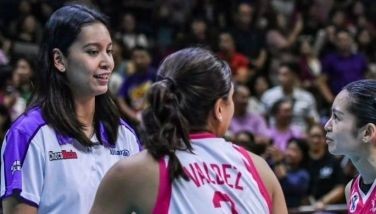Indonesia memories
You never really know what an athlete goes through for love of his or her country or sport until you’ve tried living their life, even briefly. Even for those of us who follow them constantly, there is still the veil of actual experience separating the two worlds. Though we admittedly don’t train the same way (or at all for most of us), we only get a glimpse of what their life is like when they’re on the road.
At the end of 2011, this writer flew to the Southeast Asian Games in Indonesia as an official of the national lawn bowls federation (PLBA). It was my first time to join a national team as a delegate, on this occasion, with seven petanque athletes.
It was also a very emotional time for me, as my mother had died mere days before we left the Philippines. She had spent nearly a month in the neuro ICU before succumbing to a rare illness called cerebral amyloid angiopathy (CAA). It was with a heavy heart that I kept my promise to my late kumpare and PLBA president Rey Pineda to accompany the team on his behalf.
I was issued the athletes’ and coaches’ track suit and cap, with Philippine flags stitched onto both, and the Philippine Sports Commission logo emblazoned on the jacket breast. The entire delegation of hundreds walked roughly a kilometer from the athletes village in the red dustbowl known as Palembang to the main stadium. We passed the fireworks set-up for the finale, and lined up with the other delegations. The women’s basketball team had – unsurprisingly – been informed that they would now be playing the following morning, and skipped the opening.
Good for them.
It started to rain. First a gentle drizzle, then a steady, constant rain. For an entire hour, from before we marched into the stadium and for almost the entirety of the opening ceremony. While we stood at attention in waterproof track suits in the middle of the track oval, I thought of our other officials, unprotected in their formal barong tagalogs. We dried off on the walk back to the athletes village, trying to ignore the discomfort of wet socks and sneakers. And that was just the beginning.
The sleeping arrangements were another unpleasant surprise. Our male athletes and I were grouped with two divers and their foreign coach. Our building, a wide, three-story structure of steel and prefabricated walls, was ill-suited for its purpose. We could hear female athletes chattering next door until late, as the walls seemed porous. Next, the foreign coach snored like the constipated elephant from hell. Then he would wake up at 1:30 a.m., turn on the lights, and light a cigarette in the room before stepping out. Then he would return minutes later, and the god-awful snoring would resume. All this, and we had to wake up at 5:30 a.m. Every, single, blessed night.
And so we trudged out of bed in a race with the sunrise. It was the only time the venue was available for practice. We would look over our shoulders and see our rivals: a prince from Brunei, some rich businessman’s son, and the like. No pressure.
Food was no problem, as it was always in abundance. You just had to be aware which food was spicy and which was not, or risk burning your mouth and maybe getting the runs. And if you were late for meals, you’d have to face less choices or a short wait for replenishment. And the programming on the bug TVs was determined who got there first, or who had numbers. This was proven in great detail when Pacquiao fought Marquez (again) and the Filipino athletes commandeered nearly every screen in the compound.
Getting to and from your heats was another puzzle. You could take shuttle buses, but they had limited seating, and the schedule was unclear. You could take a pedicab, but it was hot and dusty. Or you could walk, and use up a lot of energy. The choice was yours.
Then you faced the challenge of laundry. Each person was allowed to have only one top and bottom laundered each day, and needed to wait two days to get it back. So you had to decide which to hand wash yourself, your playing uniform or practice clothing. Every day.
Given all of these conditions (which vary from sport to sport and competition to competition, it’s amazing that they can even compete at all. And one tends to go a little easier in an athlete, who may face the criticism and still need to wash their own clothes, anyway.
- Latest
- Trending




























